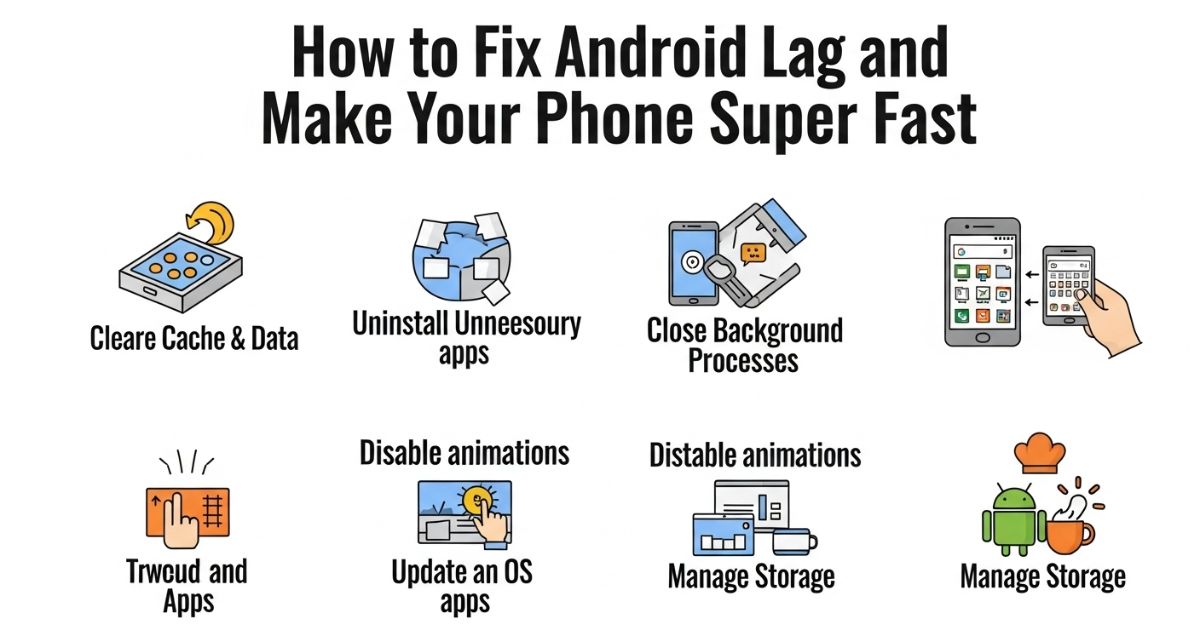Is your Android phone constantly freezing or taking ages to load apps That sluggish performance, commonly known as Android lag, can be incredibly annoying especially when you’re trying to get something done quickly. Nobody likes a phone that feels slow and unresponsive, and it often leaves you wondering if it’s time for a new device.
This guide on How to Fix Android Lag and Make Your Phone Super Fast gives you simple, effective solutions to speed up your device. From clearing junk files to optimizing settings, you’ll find easy-to-follow tips that actually work. Keep reading to discover how to make your Android feel smooth and fast again.
What Is Phone Lagging?
Phone lagging means a delay or slowdown in how your smartphone responds. It often shows up as a slow or unresponsive touchscreen, apps taking too long to open, stuttering animations, or delays when typing. In some cases, the phone may even restart on its own.
Lagging isn’t limited to Android devices it can happen on iPhones too. The severity of lag depends on factors like the phone’s hardware specifications and how it’s used on a daily basis.
Why Do Android Phones Start Lagging?
All Android phones, whether high-end or budget, tend to slow down as time passes. One major reason is storage bottlenecks, which go beyond simply having low storage space—slow internal storage can reduce performance. Background processes are another culprit since too many apps running in the background drain CPU power. Thermal throttling also affects speed, as phones automatically slow down when they overheat. Lastly, using modded apps or custom launchers can add extra load and make the phone laggy.
Why is my Android phone so slow?
Android phones often slow down due to multiple factors. Running too many apps in the background can use up memory and processing power, especially on older devices. Poorly optimized app settings, outdated operating systems, or missing updates can also affect performance.
Low storage space, defective hardware like a failing battery or overheating CPU, and malware or viruses are other common reasons for sluggish performance. Regularly clearing unused apps, updating your OS, and scanning for malware can help keep your phone running smoothly.
Would you like me to create 3 alternative versions of this summary so you can choose the best one
Why do Android phones slow down?
Older Android phones often slow down because newer apps and system updates demand more power than the device can handle. Over time, storage fills up and the battery loses efficiency, which can make the phone lag or respond slowly. These combined factors cause delays, longer loading times, and overall reduced performance.
Impacts of Phone Lagging on Users

Phone lagging creates more problems than just slow performance. It can reduce your productivity as simple tasks take much longer to complete, which is especially frustrating for students or professionals. The constant delays can also lead to stress and irritation, particularly when you need quick communication or entertainment.
- Decreased Productivity: Slow response times delay tasks and waste valuable time.
- Frustration and Stress: A lagging phone can lower your mood and create unnecessary stress.
- Missing Important Moments: Camera lag might prevent you from capturing special moments.
- Communication Disruption: Lag during calls or chats can lead to missed information or poor conversations.
- Battery Drain: A struggling system consumes more power, causing faster battery depletion.
- Risk of Data Damage: Sudden restarts caused by lag can corrupt or delete important data.
Ways to Fix Phone Lagging
To fix phone lag, focus on freeing storage, managing background apps, and keeping the system updated. Simple steps like clearing cache, reducing animations, and restarting regularly can make a big difference. If the problem persists, consider malware scans, hardware upgrades, or a factory reset.
- Clean storage and delete unused files/apps (keep 20% space free).
- Uninstall rarely used apps.
- Limit background processes to free RAM.
- Clear cache occasionally.
- Update OS and apps.
- Reduce animations or use a lightweight launcher.
- Restart weekly to refresh memory.
- Move large files to SD card or cloud.
- Scan for malware with trusted antivirus apps.
- Replace old battery or upgrade RAM if possible.
- Perform a factory reset if nothing else works.
Proven Ways to Fix Android Lag & Make It Fast Again
Free Up Storage (More Than Just Deleting Files)
- Move photos and videos to Google Photos or an SD card to free space.
- Delete unnecessary WhatsApp forwarded files that take up storage.
- Use Files by Google to remove junk files and duplicates quickly.
Restart Regularly to Kill Cache Buildup
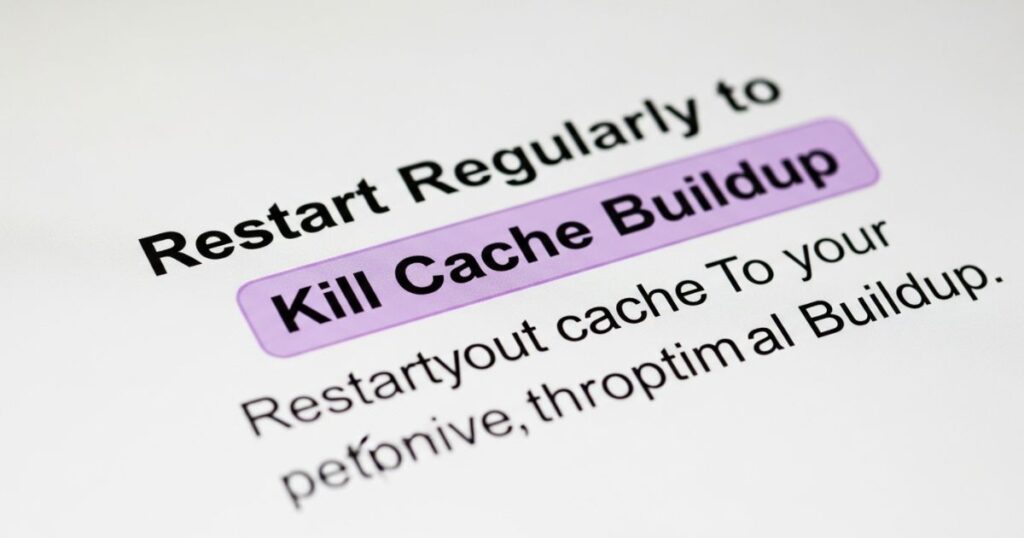
Restarting your phone helps clear temporary cache files that can slow down its performance. Competitor articles highlight that restarting your device 2–3 times per week can improve overall speed by around 18–23%.
Optimize RAM Usage
- Go to Developer Options and set Background Process Limit to 2 for better memory management.
- Avoid using RAM booster apps, as they can slow down the device instead of improving performance.
Keep Your Battery Above 40%
- Android slows down CPU performance when the battery drops below 20% to conserve power.
- Charging your phone before it falls below 30–40% helps maintain smooth and stable performance.
Uninstall Bloatware & Unused Apps
- Unused apps slow down the phone by consuming storage and background resources.
- Go to Settings > Apps and uninstall apps you don’t need.
- Use ADB commands to remove pre-installed bloatware if uninstalling isn’t allowed.
Block Unnecessary Notifications
Push notifications make apps run in the background, which can slow down your phone. To improve performance, go to Settings > Apps > Notifications and turn off any notifications that aren’t important.
Switch to a Single SIM (If Using Dual SIMs)
- Dual SIM phones continuously scan for networks, which adds extra background processes.
- This constant scanning can increase CPU load and slow down performance.
- Disabling the second SIM (if not needed) can help improve speed and reduce lag.
Limit Background Apps Without Rooting
- Open Settings > Battery > Background Restriction to stop apps from running in the background.
- Use Greenify to hibernate unnecessary apps without needing root access.
Consider a Factory Reset as a Last Resort
- A factory reset removes hidden cache files and can bring back the phone’s original speed.
- All data will be erased, so backing up your files is essential before starting.
- To reset, go to Settings > System > Reset.
How to speed up your Android device
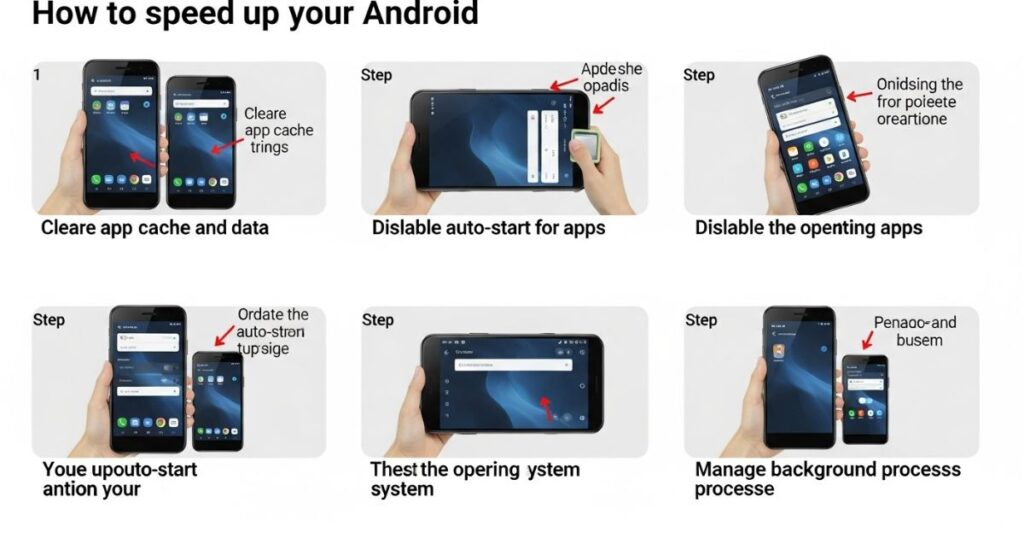
To fix Android lag, begin with a quick restart to clear temporary glitches and refresh the system. Uninstall or clean up unused apps that take up storage and slow performance. Also, limit unnecessary background activity, as it can drain memory and cause the phone to respond slowly. These simple steps are effective for troubleshooting and speeding up a sluggish Android device.
Free up space and clear old apps
One of the easiest ways to speed up an Android phone is by deleting apps you no longer use. Fewer apps mean fewer background processes draining storage, battery, and performance. To uninstall, go to Settings > Apps, select the app, and tap Uninstall.
If storage is low, consider switching to “Lite” versions of popular apps they use less space and processing power. Clearing the app cache also helps free up hidden files and junk data. Tools like Avast Cleanup can show unused apps and quickly clear invisible cache files with just a tap.
Speed up the phone’s browser
If your apps are working fine but your web browser feels slow, there are a few quick fixes. First, clear your browsing data and cache in Chrome to remove stored files that can slow down page loading. Next, close unnecessary tabs too many open tabs can make the browser sluggish, so keep only what you need and bookmark the rest. Finally, update Chrome to the latest version, as newer updates often fix bugs, improve speed, and add security patches.
Check for OS updates
Keeping your phone’s operating system updated is important for better performance, security, and new features. Sometimes updates install automatically, but you may need to check and install them manually. To check for updates, go to Settings > Software update (or System apps updater) and tap Download and install if an update is available.
You should also set your apps to auto-update to avoid the hassle of updating them one by one. To do this, open the Google Play Store > Profile icon > Settings > Network preferences > Auto-update apps, choose your preference, and tap OK.
Factory Reset your phone
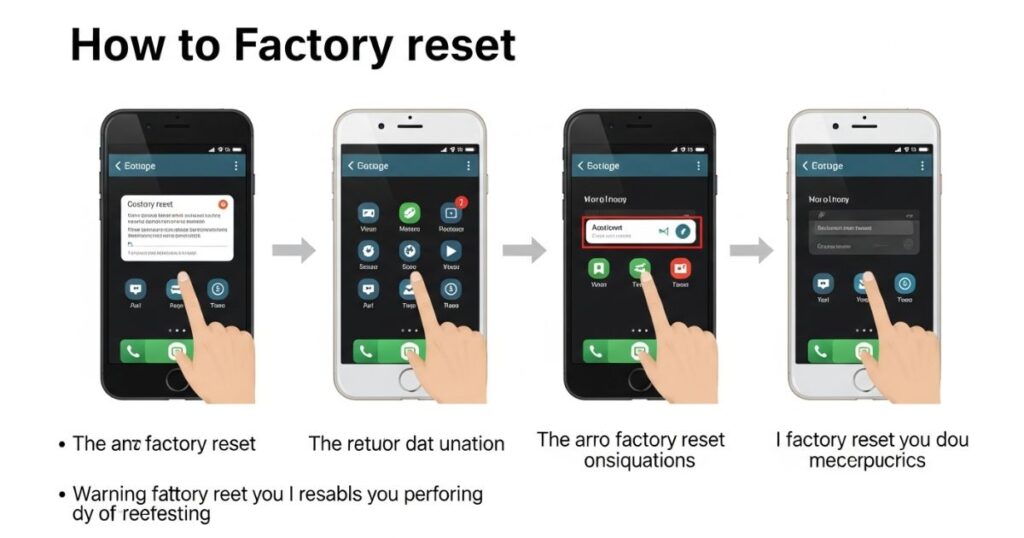
If none of the fixes work, a factory reset can give your Android a fresh start by erasing all data and returning it to its original settings. Before doing this, back up all important files because the process will wipe everything from your device. To reset, go to Settings > General Management > Reset > Factory Data Reset. Afterward, you’ll need to restore your data and apps, but avoid reinstalling apps that slow down performance. If the phone is still lagging after a reset, the issue may be hardware-related and might need professional repair.
Improve your Android device performance with Avast Cleanup
Avast Cleanup is designed to fix Android lag by clearing junk files and reclaiming valuable storage space. It keeps your phone optimized automatically, helping it run smoothly and efficiently. Even brand-new Android devices can slow down due to background clutter, so using Avast Cleanup can prevent performance issues before they start. For older phones, this tool is especially helpful in reducing Android lag and making the device feel fast again.
Restart your phone
Restarting your phone is a quick and effective way to fix sudden performance drops. It stops background processes that are hard to track and may be slowing things down.
While Android’s memory management is strong, devices with 3GB or 4GB RAM (or less) can benefit more from regular reboots. Restarting once a week is recommended, but if your phone feels slow sooner, consider doing it every other day.
Uninstall unused Android apps
Unused apps take up valuable storage and can slow your phone if they run in the background. Removing apps you don’t use can boost performance and even improve battery life. To uninstall, simply long-press the app icon and choose “Uninstall” or drag it to the uninstall option on your screen.
If you want to keep an app but clear its temporary files, you can clear its cache instead. Go to Settings > Storage > Other Apps, select the app, and tap Clear Cache.
Change the system animation speed
Changing the system animation speed doesn’t actually make your Android faster, but it makes the phone feel quicker by reducing the delay in visual transitions. Shorter or disabled animations create the impression of smoother performance, especially if your current animations feel slow. This setting is found in the developer options, and while turning animations off can make things feel faster, you’ll lose the visual transition effects.
Use Lite edition apps
Lite edition apps are designed for older or low-end Android phones with limited RAM and storage. They take up less space, use fewer resources, and run faster compared to the regular versions. While Google has discontinued its Lite apps, many popular social media platforms, like Facebook, still provide Lite versions that work smoothly on slower devices.
Update to the latest software
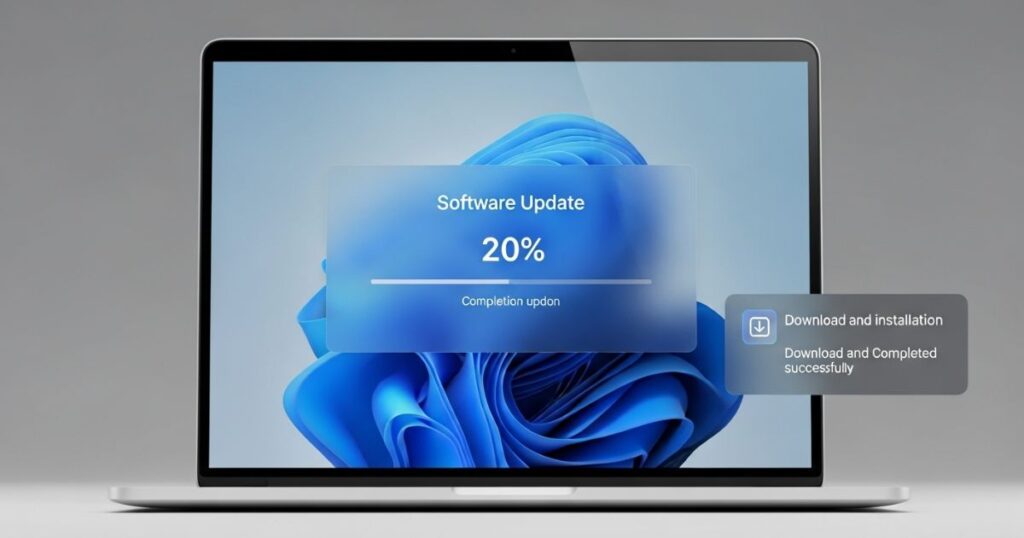
Updating your phone’s system software is one of the easiest ways to reduce Android lag and boost performance. Every new Android update includes optimizations, bug fixes, and improvements that make your device run smoother and apps load faster.
Don’t forget to update your apps from the Google Play Store, as app updates often fix glitches and enhance stability. To make things easier, turn on automatic updates over Wi-Fi, but be careful with mobile data as it can lead to extra charges or slower speeds.
Consider installing a custom ROM
If your Android phone is old or no longer supported by the manufacturer, installing a custom ROM can help improve performance and extend its life. Before doing this, check if your phone’s bootloader can be unlocked this step is essential.
Keep in mind that custom ROM installation can void your warranty and carries a risk of “bricking” your phone, which could make it unusable. Popular options like LineageOS or Paranoid Android are widely used, but you should research which one is stable and suitable for your device. XDA forums are a trusted source for guides and recommendations.
Speed up your phone ever so slightly
These tips are most helpful if you’re dealing with Android lag on a phone you’ve used for a while. Still, there’s a limit to how much you can improve performance with quick fixes. If the Android lag is severe and nothing helps, it might be time to upgrade. When replacing your device, pick a phone that matches your needs and usage habits.
Beyond Common Sense: The Secrets Nobody Talks About
Storage Type Matters More Than Storage Space
The type of storage in your phone affects speed more than how much storage you have. Budget phones with eMMC storage tend to slow down and lag over time because this storage type wears out faster. One way to reduce lag on devices with eMMC storage is by using ADB commands to disable unnecessary system apps that drain performance.
Wi-Fi & Bluetooth Drain Performance Even When Not in Use
Your phone keeps scanning for Wi-Fi and Bluetooth networks in the background, which uses RAM and CPU power, causing slower performance. A simple fix is to turn off Wi-Fi and Bluetooth scanning by going to Settings > Location > Scanning.
How to Prevent Phone Lagging
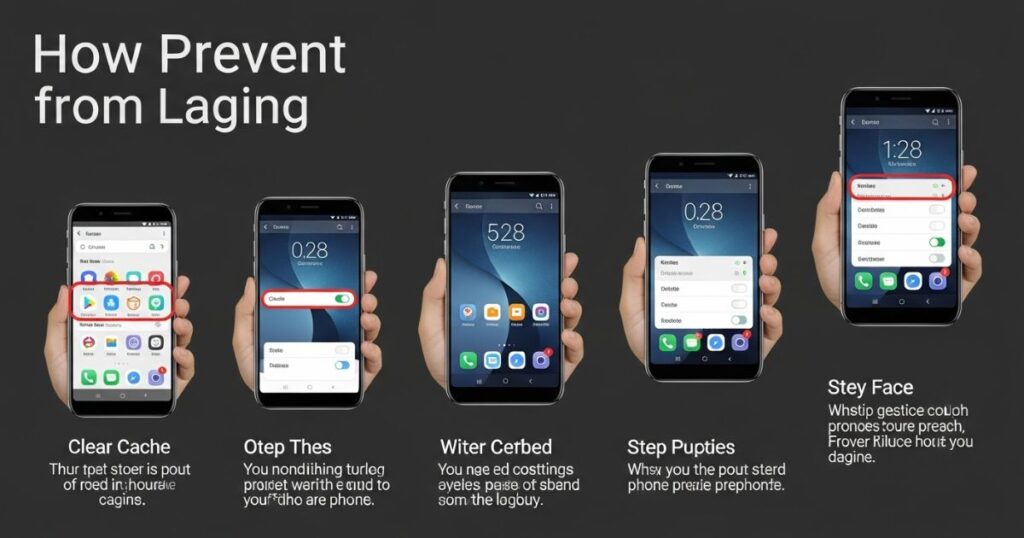
To keep your phone running smoothly, focus on prevention. Make sure there’s always enough free storage space and avoid installing too many apps. Only download apps from official sources to reduce the risk of malware. Regularly update both your system and apps to improve performance. Limit excessive multitasking, use reliable antivirus software, and prevent your phone from overheating to avoid lag issues.
Read More: Technology Falcon
Myths and Facts about Phone Lagging
• Myth: Deleting cache always speeds up the phone
Fact: Cache is designed to make apps load faster, so deleting it too often can actually slow performance.
• Myth: Closing all background apps saves battery
Fact: Forcing apps to close makes them restart from scratch, which can drain more battery instead of saving it.
• Myth: Cleaner apps are always safe and effective
Fact: Some cleaner apps are harmful and may slow down your phone or even carry malware.
• Myth: Android phones lag more easily than iPhones
Fact: Any phone can lag, regardless of brand, depending on its hardware and usage.
• Myth: Adding RAM always solves lag issues
Fact: RAM is just one part of performance; other factors like storage and software also matter.
Detective Work
When your smartphone slows down, you need to figure out what’s causing it. Common issues include overloaded CPU or RAM filled with background apps. Using system monitoring tools can help pinpoint the problem. Apps like Trepn Profiler, AIDA64, Simple System Monitor, or Full System Info let you track real-time CPU and RAM usage. If you notice unusually high CPU activity, it’s likely that a background app is draining your phone’s performance.
App Management
One common cause of Android lag is apps running in the background, especially social media and messaging apps that constantly use processing power and network resources. If a particular app is causing your phone to slow down, you can use an app killer to stop its processes. For apps that aren’t necessary, it’s best to uninstall them entirely. Antivirus apps can also create Android lag if they run scans randomly, so scheduling regular scans can help prevent slowdowns.
Hardware Issues
Hardware problems are less common but can cause noticeable lag, especially on older devices. Over time, battery performance naturally declines, and a weak battery can slow down your phone’s overall performance. If your device lags and the battery no longer holds charge like before, replacing it either through the manufacturer or by yourself can help. Another factor is simply outdated hardware; newer smartphones are much faster, so using an older model might make the lag feel more obvious compared to modern devices.
Read More: Technology Falcon
FAQ’s
What causes phones to slow down over time?
A build-up of cache, outdated apps, or aging hardware can make your phone sluggish.
Can clearing junk files improve speed?
Yes, removing unnecessary files and cache frees up storage and boosts performance.
Do software updates help with performance issues?
Absolutely, updates often fix bugs and improve system stability.
Is replacing a weak battery worth it?
A failing battery can slow down performance, so replacing it can make a big difference.
How do I fix Android lag quickly?
Simple tweaks like disabling background apps, clearing cache, and updating software can reduce Android lag fast.
Conclusion
Dealing with Android lag doesn’t mean you need a brand-new phone it often just takes the right tweaks to bring back smooth performance. By addressing common issues like outdated hardware, battery problems, or unnecessary clutter, you can make your device feel fast and responsive again. With a few smart fixes, your Android can run almost like it did on day one, giving you a seamless experience without the frustration of constant slowdown.

I’m Rana Waseem, an SEO blogger with a passion for creating content that ranks and drives results. With a deep understanding of search engine optimization and keyword strategy, I help businesses and readers discover valuable information through well-researched, engaging blog posts. My goal is to simplify SEO for everyone while staying ahead of the latest trends in digital marketing


